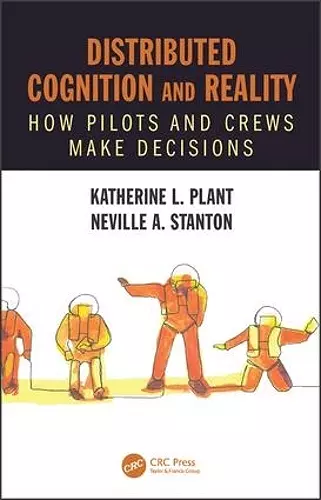Distributed Cognition and Reality
How Pilots and Crews Make Decisions
Neville A Stanton author Katherine L Plant author
Format:Hardback
Publisher:Taylor & Francis Ltd
Published:12th Oct '16
Currently unavailable, and unfortunately no date known when it will be back
This hardback is available in another edition too:
- Paperback£62.99(9780367882075)

Distributed Cognition and Reality puts theory into practice, as the first book to show how to apply the Perceptual Cycle Model in aviation decision making. Based on case studies, critical incident interviews and live observations in cockpits, the authors develop a new way to understand how pilots and crews make decisions. This book will be useful for practitioners involved in accident and incident investigations and decision-making training, researchers and students within the disciplines of Aviation, Human Factors, Ergonomics, Engineering, Computer Science, and Psychology.
Dr Katherine L Plant is a New Frontiers Fellow in Human Factors Engineering at the University of Southampton in the UK. In 2014 she was awarded the Honourable Company of Air Pilots Prize for Aviation Safety Research.
Professor Neville A Stanton holds the Chair in Human Factors Engineering at the University of Southampton in the UK. In 2007 The Royal Aeronautical Society awarded him the Hodgson Medal for his work on flight-deck safety.
The perceptual-cycle model (PCM) is one of the few approaches that truly integrates humans, systems, and environments. Plant and Stanton's thorough and detailed explanation of PCM, along with its application to understanding pilot decision making in critical situations, is a tremendously valuable resource for researchers and practitioners in this field. This book will be indispensable for all of us in the field of aviation human factors.Professor Steven Landry, Purdue University, USA
Plant and Stanton have produced a remarkable piece of work in the field of aeronautical decision making. As an expert in the field, I find the Perceptual Cycle Model is extremely interesting. This book will be a valuable reference for accident analysis in practice as well as offering new research directions in the field. Prof Guy André Boy, Florida Institute of Technology, USA
This book challenges existing cognitive explanations of decision making to look beyond individual models and consider the dynamic collaborations between crew members.This book provides an analytic framework for improving our understanding of the precursors to critical events.A key contribution is to demonstrate the practical utility of tools that have a strong theoretical foundation. Professor Chris Johnson, University of Glasgow, UK
This book deserves a large audience and the theory is applicable to much wider domains for investigating incidents in other safety-critical systems. It moves significantly beyond the state-of-the-art accounts of learning from (human) error and contains many stimulating ideas for future research and practice in cognitive systems. I can highly recommend this book to engineers, practitioners, and academics who work on improving the safety of complex socio-technical systems, both through their design and in training the human operators. Professor Max Mulder, Technical University Delft, The Netherlands
ISBN: 9781472482983
Dimensions: unknown
Weight: 521g
250 pages